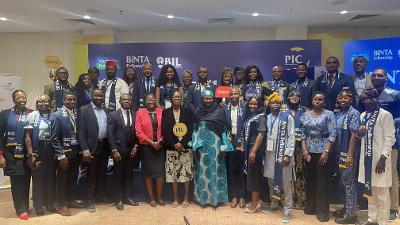The Code of Conduct Bureau (CCB) says Public-Private Partnership (PPP) is key to strengthening the fight against corruption in Nigeria.
This initiative seeks to leverage the collective expertise, resources, and strengths of both public and private sector stakeholders to combat corruption more effectively.
This partnership can facilitate knowledge sharing, resource pooling, and innovative solutions to address corruption.
The Chairman of the CCB, Abdullahi Bello made the call in Abuja, the nation’s capital during the maiden graduation ceremony of Behavioral Insights Network, Transparency and Accountability (BINTA) Fellowship project organised by the Policy Innovation Centre (PIC) and funded by MacArthur Foundation.
Bello said he was excited about the partnership between the CCB and private partners in the fight against corruption.
He is of the belief that a collaborative approach is essential in promoting transparency, accountability, and integrity in governance.
“I’ll like to extend my sincere appreciation to the MacArthur foundation for their support for this important initiative. Your continued investment in Nigeria’s future is invaluable and we are all deeply appreciative of your partnership and quest for a more transparent and accountable society.”
He said the event marks a significant milestone not only for the BINTA fellows but for the fight against corruption and promotion of ethical practice in both public and private sectors of our great nation.
“It is my firm believe that the knowledge, insight and solutions by the BINTA fellows will make a significant impact on the way we approach governance and anti corruption initiatives in Nigeria.”
The Executive Director PIC, Dr Osasuyi Dirisu in her welcome address explained that the BiNTA fellowship was designed to strengthen the capacity of anti-corruption change makers to leverage behavioral insights to disrupt the socially normative status of corruption in Nigeria.
According to Dirisu “You don’t have to be perfect, you will keep improving and pushing through. But the insights are useful in ensuring that we’re driving a community, a large ecosystem of people who can really do very valuable work when it comes to issues relating to anti-corruption.
“But just to give a brief overview of how we got here, this project is called “Harnessing Behavioural Insights to Counter Corruption.” she added
Victor Ajieroh, a BiNTA Fellow while sharing his experience said the fellowship has empowered him with innovative skills to contribute to addressing corruption, one effort at a time, in various communities and issues.
”The initiative aims to systematically tackle corruption through an innovative approach, involving 30 fellows trained to drive change, learning management systems for scalability, and Community-focused efforts leading to widespread impact.”
He added that “With the skills to be able to identify issues, define the problem effectively, understand the causes, design intervention tests, implement them and scale them in that way, we begin to address the issue of corruption one effort at a time, one community at a time, one issue at a time, one little place at a time and the accumulation of the little spaces begin to lead to the widespread change you want to see so no hope is lost”.
The BiNTA Fellowship is a professional programme designed to build the capacity of participants to lead systems-level change.
For this edition, 30 graduands of the BiNTA fellowship went through rigorous training, mentorship, and implementation phases, the Fellowship equips change-makers with innovative, evidence-based approaches to advance various sectors in the country.
According to the PIC, the graduation celebrates the Fellows’ achievements and shines a spotlight on the critical importance of anti-corruption and leadership in shaping better systems.


Comments are closed.